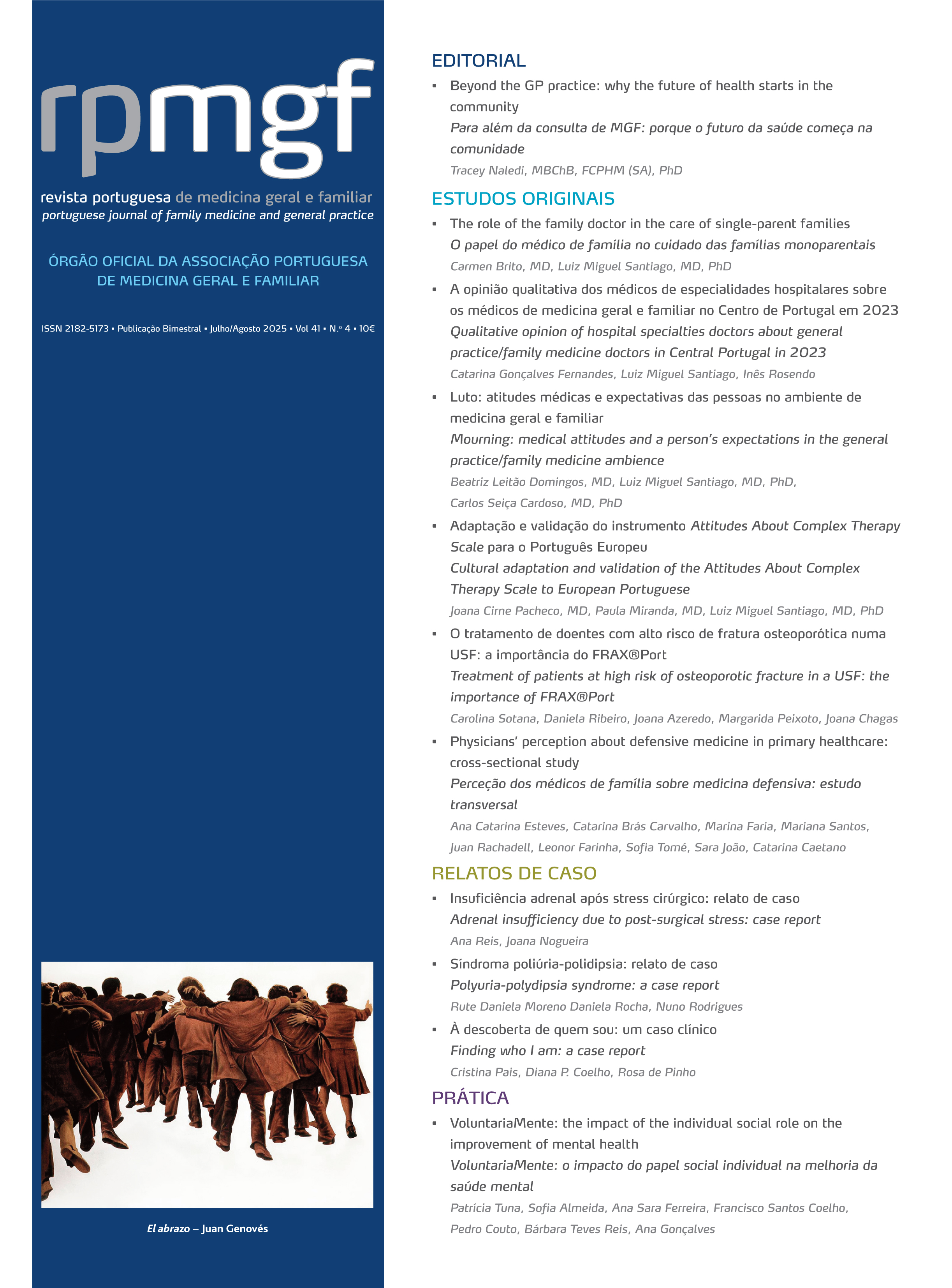VoluntariaMente: the impact of the individual social role on the improvement of mental health
DOI:
https://doi.org/10.32385/rpmgf.v41i4.14133Palavras-chave:
Mental health, Anxiety, Depression, Volunteers, Primary health careResumo
Introduction: Mental health problems are amongst the most common health issues seen worldwide. They are an important cause of morbidity and social isolation. This work aimed to implement an intervention project with people who suffer from anxiety and/or depressive disorder to improve their depression and anxiety scores.
Methods: Patients from a Portuguese Family Healthcare Unit medicated with anxiolytics and/or antidepressants, to treat their anxiety and/or depression disorders, were selected and integrated into a volunteering project that lasted a year. Anxiety symptoms were measured by the Hamilton Anxiety Scale, and depression scores were quantified by the Patient Health Questionnaire-9, both before and after the intervention.
Results: Thirty-three participants were selected, and 25 were included in the project. The majority were female, over 50 years old, and performed an average of 48 hours of volunteering. There was a statistically significant reduction in levels of anxiety and/or depression scores after the intervention, regardless of the number of volunteer hours performed.
Conclusions: It is suggested that qualified and accompanied volunteer work can help reduce anxiety and depression scores.
Downloads
Referências
1. Apóstolo JL, Figueiredo MH, Mendes AC, Rodrigues MA. Depression, anxiety and stress in primary health care users. Rev Lat Am Enfermagem. 2011;19(2):348-53.
2. Sartorius N, Ustün TB, Lecrubier Y, Wittchen HU. Depression comorbid with anxiety: results from the WHO study on psychological disorders in primary health care. Br J Psychiatry Suppl. 1996;(30):38-43.
3. Lloyd C, Tse S, Deane FP. Community participation and social inclusion: how practitioners can make a difference. Aust eJ Adv Ment Health. 2006;5(3):1-10.
4. Seabrook EM, Kern ML, Rickard NS. Social networking sites, depression, and anxiety: a systematic review. JMIR Ment Health. 2016;3(4):e50.
5. Yang J, Matz C. A latent deprivation perspective: mechanisms linking volunteering to mental health in later life. Int J Aging Hum Dev. 2022;95(1):110-30.
6. Ramos R, Brauchli R, Bauer G, Wehner T, Hämmig O. Busy yet socially engaged: volunteering, work-life balance, and health in the working population. J Occup Environ Med. 2015;57(2):164-72.
7. Seligman ME. Flourish: a visionary new understanding of happiness and well-being. New York: Free Press; 2011. ISBN 9781439190753
8. Kragh G, Stafford R, Curtin S, Diaz A. Environmental volunteer well-being: managers' perception and actual well-being of volunteers. F1000Res. 2016;5:2679.
9. Carlton S, Wong JH. Applying the PERMA framework to young volunteers in Aotearoa New Zealand. Int J Appl Posit Psychol. 2023;8(3):599-620.
10. Hamilton M. The assessment of anxiety states by rating. Br J Med Psychol. 1959;32(1):50-5.
11. Santos ER, Coelho JC, Ribeiro I, Sampaio F. Translation, cultural adaptation and evaluation of the psychometric properties of the Hamilton Anxiety Scale among a sample of Portuguese adult patients with mental health disorders. BMC Psychiatry. 2023;23(1):520.
12. Monteiro S, Torres A, Pereira A, Albuquerque E, Morgadinho R. 2017 – Preliminary validation study of a Portuguese version of the Patient Health Questionnaire (PHQ-9). Eur Psychiatry. 2013;28(S1):1.
13. Kroenke K, Spitzer RL, Williams JB. The PHQ-9: validity of a brief depression severity measure. J Gen Intern Med. 2001;16(9):606-13.
14. Ballard PJ, Daniel SS, Anderson G, Nicolotti L, Caballero Quinones E, Lee M, et al. Incorporating volunteering into treatment for depression among adolescents: developmental and clinical considerations. Front Psychol. 2021;12:642910.
15. Anderson ND, Damianakis T, Kröger E, Wagner LM, Dawson DR, Binns MA, et al. The benefits associated with volunteering among seniors: a critical review and recommendations for future research. Psychol Bull. 2014;140(6):1505-33.
16. Chan W, Chui CH, Cheung JC, Lum TY, Lu S. Associations between volunteering and mental health during COVID-19 among Chinese older adults. J Gerontol Soc Work. 2021;64(6):599-612.
17. Webster NJ, Ajrouch KJ, Antonucci TC. Volunteering and health: the role of social network change. Soc Sci Med. 2021;285:114274.
Downloads
Publicado
Edição
Secção
Licença
Direitos de Autor (c) 2025 Revista Portuguesa de Medicina Geral e Familiar

Este trabalho encontra-se publicado com a Licença Internacional Creative Commons Atribuição-NãoComercial-SemDerivações 4.0.
Os autores concedem à RPMGF o direito exclusivo de publicar e distribuir em suporte físico, electrónico, por meio de radiodifusão ou em outros suportes que venham a existir o conteúdo do manuscrito identificado nesta declaração. Concedem ainda à RPMGF o direito a utilizar e explorar o presente manuscrito, nomeadamente para ceder, vender ou licenciar o seu conteúdo. Esta autorização é permanente e vigora a partir do momento em que o manuscrito é submetido, tem a duração máxima permitida pela legislação portuguesa ou internacional aplicável e é de âmbito mundial. Os autores declaram ainda que esta cedência é feita a título gratuito. Caso a RPMGF comunique aos autores que decidiu não publicar o seu manuscrito, a cedência exclusiva de direitos cessa de imediato.
Os autores autorizam a RPMGF (ou uma entidade por esta designada) a actuar em seu nome quando esta considerar que existe violação dos direitos de autor.





